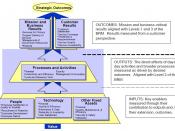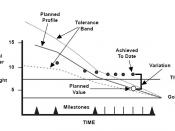Introduction
This report considers performance measurement as applied to the public sector as part of the new public management agenda. Key to the discussion is the selection and use of performance indicators. The paper attempts to set out the principles of performance measurement, offer explanations of why public sector performance is measured, as well as looking at different approaches. Some problems are identified and finally using a local government case study performance measurement is placed in a broader political and organisational context.
Managerialism, Consumerism and Performance Measurement
The management of public services in the UK has undergone a period of major change, which can be traced back to the Conservative Government of 1979 who held the view that the sector had too large a share of gross domestic product was inefficient in its operation and was not properly accountable for its activities (Glynn and Murphy 1996). Much was made at the time of the "good" of the private sector and the "bad" of the public sector.
As Isaac-Henry, Painter and Barnes (1997) describe the Thatcher Government placed the private sector on a pedestal to which the public sector should aspire whether they agreed to or not. The authors also outline the managerialist view at that time which was that public sector "failure" up to 1979 was due to a lack of proper management which should be derived from the private sector, and the need for an emphasis on the role of the consumer leading to improved quality at lower cost. Performance measurement approaches represent an attempt to address both the consumerist and managerialist agendas.
It is important to note that the New Labour Government, post 1997 has, despite criticising the Conservatives whilst in opposition for its reform of the public sector, not only embraced the approach but expanded the model...


